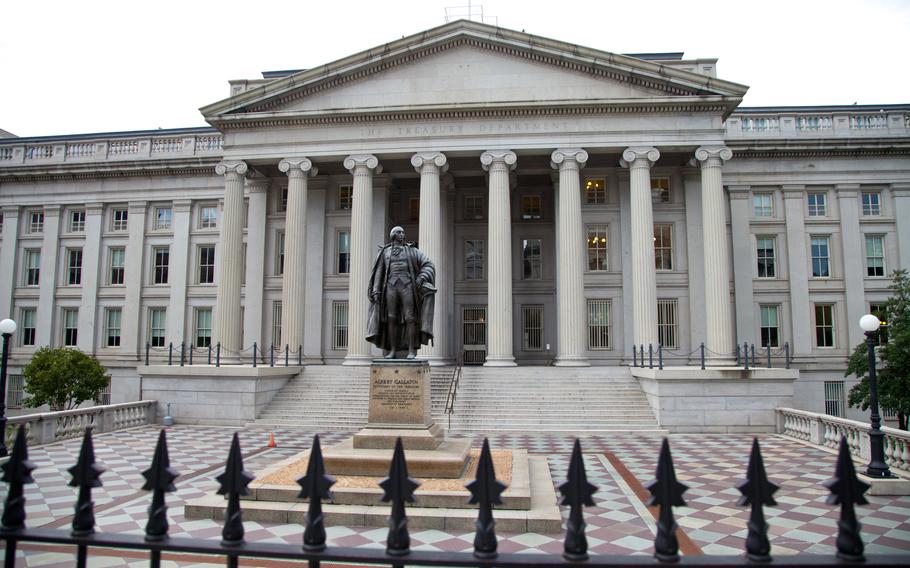
The U.S. Treasury Building in Washington D.C., July 15, 2012. (Wikimedia Commons)
CAMP HUMPHREYS, South Korea — The United States imposed sanctions this week on six people and two companies in China, Russia and the United Arab Emirates that allegedly helped fund North Korea’s weapons program.
The U.S. Treasury Department is freezing all U.S. property belonging to Yu Pu Ung, Ri Tong Hyok, O In Chun, Han Chol Man, Jong Song Ho and Jon Yon Gun, according to a news release from the Office of Foreign Assets Control on Wednesday. The office did not specify how much the frozen assets are worth.
Yu, based in China, is the “linchpin” of North Korea’s illicit financing program, according to the Treasury Department.
Yu and Ri represented Tanchon Bank, the financial arm of the Korea Mining Development Corp., which the U.N. Security Council describes on its website as North Korea’s primary arms dealer and funded by North Korean IT workers employed abroad.
South Korea’s Ministry of Foreign Affairs is sanctioning the same individuals and accused them of financing the North’s nuclear and missile program, according to a separate news release Thursday.
The combined effort reflects Washington and Seoul’s goal of curbing North Korea’s “efforts to generate revenue for its illicit and destabilizing activities,” Brian Nelson, Treasury undersecretary for terrorism and financial intelligence, said in the department’s release.
“The United States, along with our South Korean partners, will continue to take action to safeguard the international financial system and prevent [North Korea] from funding its illegal weapons programs,” Nelson said.
Allis LLC, a Russian company, and Pioneer Bencont Star Real Estate of the UAE were accused by the Treasury Department of funneling over $2.5 million to their parent company, the Chinyong Information Technology Cooperation Co. Under the sanctions, U.S. citizens and companies are prohibited from dealing with the two companies and their U.S.-based assets are frozen.
Chinyong, based in North Korea, funds its military through the salaries of IT employees working from Russia and Loas, according to the Treasury Department.
The sanctions follow the creation of a U.S.-South Korean task force targeting illicit oil transfers to North Korea.
The new Enhanced Disruption Task Force met for the first time Tuesday in Washington, D.C., to discuss blocking North Korea’s illegal procurement of refined petroleum, which is essential for the communist regime’s nuclear and missile programs, South Korea’s Foreign Affairs Ministry said in a news release Wednesday.
A 2017 U.N. Security Council resolution limits the communist regime’s imports of crude oil to 4 million barrels and refined oil to 500,000 barrels a year.
Despite this cap, however, North Korea is estimated to have imported over 1.5 million barrels of refined oil between January and September 2023, using methods like ship-to-ship transfers, according to the Foreign Affairs Ministry.
Russia and China are the primary sources of North Korea’s oil, according to the Security Council. The task force members during their meeting “expressed concern over the possibility that Russia may provide refined oil to North Korea as their relations become closer,” the ministry said.
“The two sides strongly urged Russia to faithfully implement the [U.N. Security Council] resolutions as it has declared that it would,” the release said.